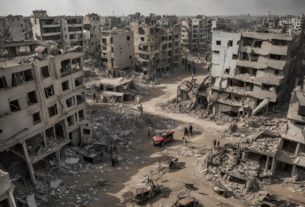Israel’s raid on Jenin in 2025 has left the city devastated, with widespread damage to residential, commercial, and public infrastructure. The operation targeted militant groups in the area but caused severe harm to civilian areas. Thousands of people have been displaced as homes, schools, and hospitals have been destroyed. The situation is so dire that much of Jenin is considered nearly uninhabitable. Essential services, including access to clean water and electricity, have been cut off for most of the population, leaving survivors without the resources they need to sustain themselves.
The international response to this crisis has been swift, with aid flowing into Gaza and surrounding regions. Humanitarian organizations are working to provide emergency relief to those affected by the violence. The United Nations and other international bodies have condemned the raid and are calling for immediate action to address the humanitarian crisis. However, access to affected areas remains restricted due to the ongoing conflict, limiting the ability of aid groups to reach those in need. Health facilities in Gaza, already overwhelmed by the ongoing violence, are struggling to care for the increasing number of injured civilians.
In Gaza, the situation is equally dire. The blockade and restrictions on movement have made it extremely difficult to provide sufficient aid to the population. While international organizations are assisting, it is often insufficient to meet the growing demand. The local population faces widespread displacement, with many residents living in overcrowded shelters or in temporary accommodations that lack basic facilities. Hospitals and clinics are running low on supplies, and medical staff are stretched thin, unable to treat the growing number of casualties.
The damage in Jenin is not limited to physical infrastructure. The raid has also disrupted vital services, including healthcare and education. Schools in the area have been destroyed or repurposed for emergency shelters, leaving children without access to education. Medical clinics are struggling to provide even the most basic care to those injured in the attack. With the destruction of vital infrastructure and services, it will take years for Jenin to recover fully and even longer for the people to rebuild their lives.
Rebuilding Jenin and addressing the humanitarian needs in Gaza will face significant challenges. The area has extensive physical damage, and the ongoing conflict makes it difficult to initiate large-scale reconstruction. Essential services like clean water, electricity, and medical care will take months, if not years, to restore fully. The region’s lack of stability makes coordinating practical relief efforts even more challenging. The ongoing violence and restrictions on movement hamper efforts to rebuild health facilities, schools, and homes.
The situation in Gaza is compounded by the difficulty of providing aid under the current circumstances. Humanitarian organizations are working under severe limitations, including limited access to the region and the threat of ongoing violence. While assistance arrives, it is often insufficient to meet the population’s growing needs. The number of casualties continues to rise, and the toll on the local population is staggering. Without a stable environment, rebuilding efforts will be limited, and long-term recovery will remain uncertain.
The international community’s response to the ongoing conflict has been varied. Some nations have called for an immediate ceasefire to allow for the delivery of aid and the protection of civilians. Others have focused on providing financial support to humanitarian groups working in the region. However, these efforts are insufficient to stem the tide of destruction, and a long-term solution remains elusive. The situation in Jenin and Gaza highlights the difficulty of achieving peace in a region marred by decades of conflict.
Ultimately, the destruction in Jenin and Gaza serves as a stark reminder of the human cost of military conflict. The cycle of violence and suffering will continue unless lasting peace can be achieved. For the people of Jenin, the destruction of their city will leave scars that may take generations to heal. Rebuilding the city and providing for the needs of its residents will require coordinated international efforts, along with a commitment to ending the violence that has plagued the region for so long. Without a clear path to peace, the ongoing humanitarian crisis will persist, making it challenging to provide the stability and security that the people of Jenin and Gaza desperately need.




